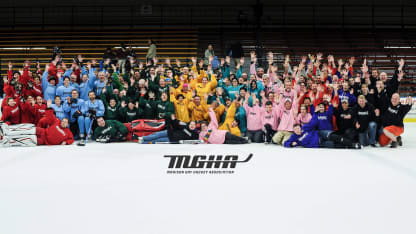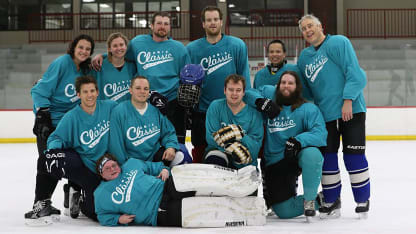He also built a home for gay hockey. Farabaugh aggressively recruited participants; if they didn't know how to play hockey, no problem -- he would help teach them.
"In years past, we would start the season with four weeks of clinics; once a week, every Sunday," MGHA vice president Tim Tender said. "Then we'd do two weeks of evaluations and challenge games, split by skill level. After that, two weeks of practice with a team, and then we would start games. We'd start the season in the first week in September, the first Sunday after Labor Day. We wouldn't get games until the first week in November. So it was almost two full months of gearing up for the league, learning how to play, basics. It's great for beginners."
Maggie Augustin was comfortable on skates after years of in-line skating, but she didn't know much about hockey. A self-described introvert, she said the league also brought her out of her shell.
"Besides learning an entirely new sport at 30, it helped me a lot with personal problems and challenging myself," said Augustin, member relations liaison on the MGHA board of directors. "I've played other sports for other groups for as long as I can remember, and I've never played in such a welcoming group, a group that wants to get other people involved and not just learning hockey. It's so much more, the community is a place to go besides your stereotypical bar scene for LGBTQ folks."
Word of mouth has been a recruiting tool. Sarah Bottjen was introduced to the league by Libs, one of her best friends.
"I didn't do it the first year because I was worried about starting a new sport," said Bottjen, who was a competitive Alpine skier in high school and college. "But I finally said yes, I'll do it, and I've loved it ever since.
"I've lived relatively authentically for most of my life, but there are still spaces I occupy where I don't disclose my identity or orientation," Bottjen said. "The league gives me a space where I can be the most authentic version of me without worry of retribution. It's a special thing."
The MGHA continues to expand. Farabaugh said the league could have 12 teams this season. Games will be played at Bob Suter's Capitol Ice Arena in Middleton, Wisconsin, 10 miles northwest of Madison. Capitol has two full sheets of ice compared to the one-sheet Hartmeyer Ice Arena, the league's former home. There will also be two divisions, one for beginners and another for advanced players.
Much is changing with MGHA, but the overall message and welcoming atmosphere for everyone will not.
"One of the things with his league is it's inclusivity, but it's inclusivity in the form of the not-being-picked-last-for-gym-class effect," Tender said. "We have a member in our league, when we're talking about changes to the league or things we're attempting to do, he says, 'As long as we don't lose that feeling, that not-being-picked-last-in-class effect, it's great.'"



